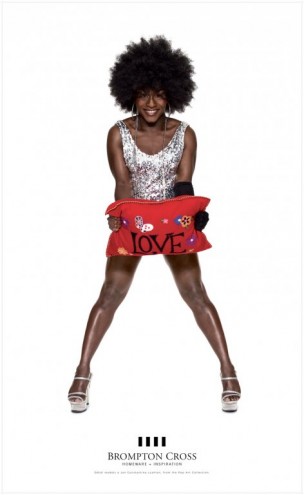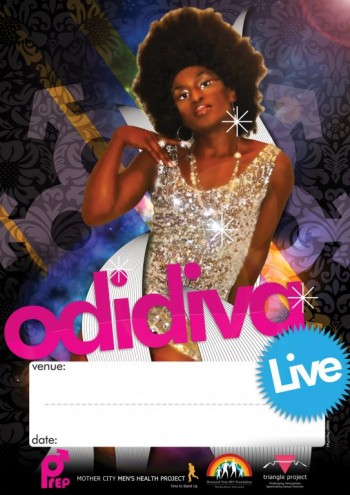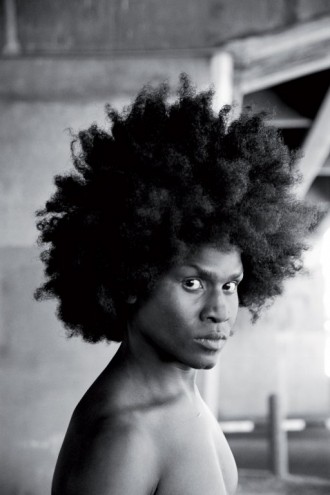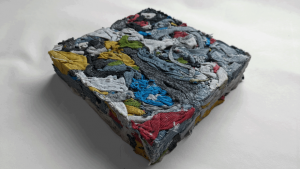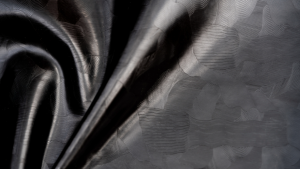First Published in
“I’m the face for the Desmond Tutu HIV Foundation’s new PrEP Drug trial,” is the first thing Odidi Mfenyana – alter ego Odidiva – tells me at our interview.
A week before the interview I had caught his Odidiva show at Beefcakes, the newish burger joint in De Waterkant gay village. The show has been sold out since January. Odidiva likes to brag about being the “only live act black drag queen in Cape Town”. That translates as: no lip-synching, no impersonation – everything is live, proud and personal. But what really distinguishes her is her political edge.
She likes to be compared to Evita Bezuidenhout in that regard, but Odidiva is a guerrilla fighter in comparison. She’ll have you up an’ dancing to Brenda Fassie’s Weekend Special and while you’re still pulling in your chair, punch you in the stomach with something like: “If we don’t invest in education now, we are still going to be robbed at gunpoint in 20 years time.” Which will only have you laughing even louder at her next quip about christening Jacob Zuma as “President Lovepants”.
“With this accent and a dress on, you can say things that people would not normally say,” Mfenyana explains his feminine alter ego at the interview. We’re back at Beefcakes, the pink loveseats looking all the more OTT with the daylight streaming through the full height windows. As the only gay club in the district open to prying eyes, the crowd of car guards and homeless people that gather outside to watch her show at night are back to business. Shirley Bassey is crooning in the background, John Waters’s Pink Flamingos playing silently on the TV screen and I’m talking to the face of the Desmond Tutu HIV Foundation’s new PrEP Drug trial. Is this the rabbit hole?
According to the foundation’s website: “PrEP is a therapy taken to prevent, rather than to treat, an infection or illness, and it is one strategy being studied by the foundation as part of its effort to develop new HIV prevention tools.” It goes on to explain that “the study is currently enrolling 200 healthy, sexually active, HIV-negative gay men who are at high risk of HIV infection”.
People have premeditated unprotected sex!? “Boys don’t listen. Research has proven it,” Mfenyana admonishes me. Besides, he goes on: “In South Africa there’s a perception that it’s a straight black disease, which then leaves a whole bunch of white boys contracting HIV, which has actually become more prevalent than anything else. Then also, condoms have gone out of fashion and people are barebacking.”
Where government leadership has failed, the Desmond Tutu HIV Foundation has positioned itself as the progressive answer to the HIV problem in South Africa. It drives the typical awareness programmes, but also facilitates easy access testing, numerous clinical and vaccine trials, and niche community groups. It has also come out strongly against homophobia over the past few months; both in South Africa and the rest of the continent. South Africa is the only African country in which same sex marriage is legal. The rest of Africa is still a long way off, with gay sex illegal in 36 of the continent’s 54 countries.
“The constitution we have is essentially miles ahead of the society in which we live,” Mfenyana shakes his head. “The society is pretty much what apartheid did to it – conservative, highly Christian and patriarchal.” Interestingly, mainstream SA will probably never forget him playing an openly gay detective in the award-winning SABC1 crime drama Interrogation Room in 2007. In a country that in the past 15 years has only had about five openly gay characters written into public television, that is still a big deal.
“If society was actually a bit more open about its sexuality, there would be less problems. People need to talk about it more,” he insists. It is fitting then that Odidiva continues her career as a creative crusader for political justice. “Odidiva gets away with more. For me to say these things on stage as Odidi would never wash over. People would find it insulting. You can get away with anything in a dress, which is kind of why Pieter-Dirk Uys did it in the first place.”
Meanwhile, to the rest of the world, Mfenyana as Odidiva is the star of House of the Holy Afro, which was performed for the first time in Switzerland in 2004 at the Decade of Democracy celebrations. Since then it has shown around the world to sold-out audiences, including at the 2005 Life Ball in Vienna where Heidi Klum, Elton John, Versace and Liza Minnelli were counted among the guests.
Like with much of the country’s best creative produce, this dazzling spectacle of Afro kitsch has not had a full showing in South Africa. Directed by Brett Bailey and featuring DJ Dino Moran live, a chorus line of princesses and the Odidiva queen herself, the cabaret-turned-club show has never found a suitable venue. Over the period of the World Cup, however, the Market Theatre in Johannesburg has agreed to pull up its seats and transform itself into a theatrical disco.
“The idea is for tourists to do the whole of Newtown in one day – do Constitutional Hill in Braamfontein and Africa Museum in Newtown, watch the match on Mary Fitzgerald Square, dine at Mojos and catch the show in the evening,” explains the excited Mfenyana. “I can’t wait to impress the New York of Africa (Johannesburg),” he laughs.

